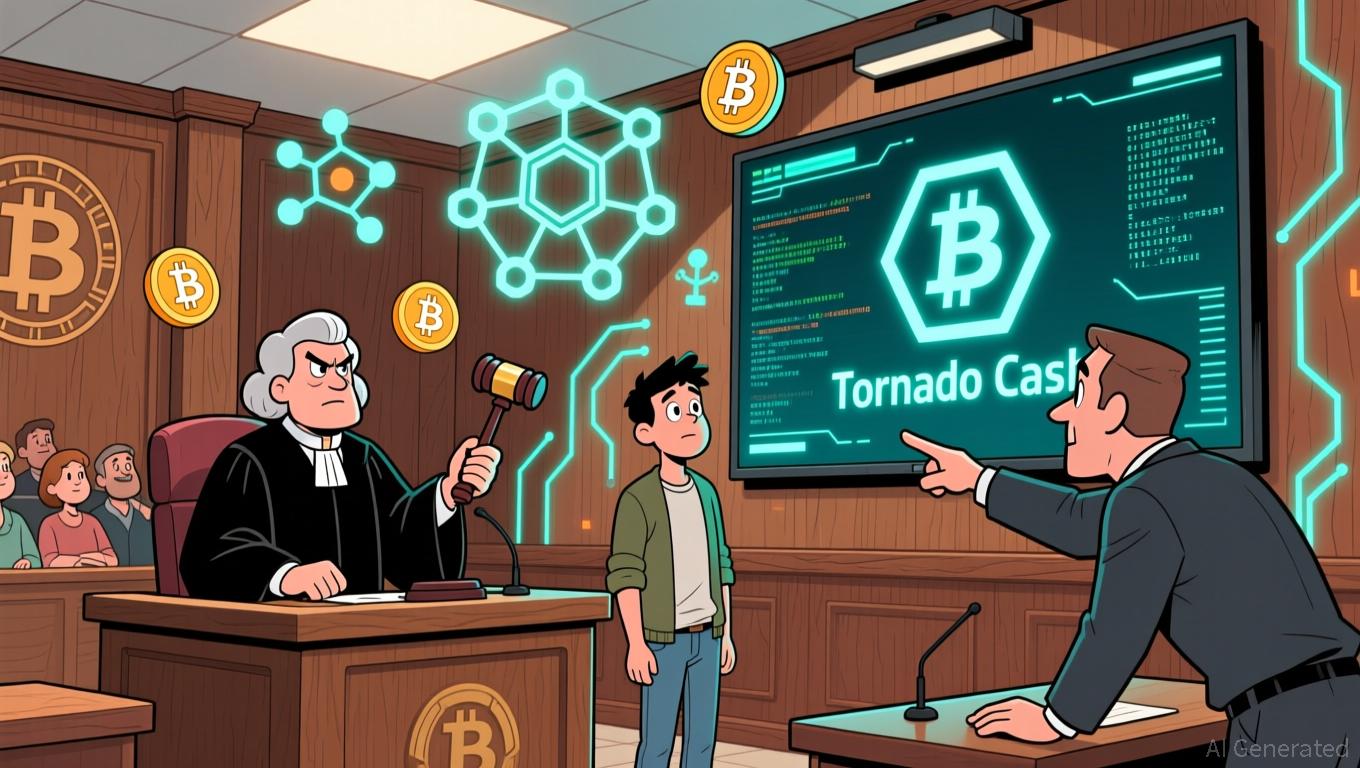Crypto Organizations Caution: Guilty Verdict May Turn Code Expression Into a Crime
- Over 65 crypto groups urge Trump to intervene in Tornado Cash co-founder Roman Storm's legal case, arguing code should be protected speech under the First Amendment. - Storm faces charges for operating an unlicensed money transmittal service, with his defense citing recent DOJ guidance against prosecuting decentralized software developers. - Advocates demand tax clarity for crypto staking/mining and SEC safe harbor rules, aligning with Trump's "Crypto Capital" campaign promises and Zhao's pardon. - DOJ m
Over 65 organizations supporting cryptocurrency and blockchain have increased their calls for U.S. President Donald Trump to step in regarding the legal proceedings against Roman Storm, one of the creators of the Tornado Cash DeFi protocol. Among these organizations are the Solana Policy Institute, Blockchain Association, and DeFi Education Fund,
In August 2023, Storm was found guilty on one of three counts: conspiring to operate an unlicensed money transmitting business. The jury could not reach a verdict on two other charges involving money laundering and violating sanctions

The letter sent to Trump also included broader policy recommendations, such as clarifying tax rules for digital assets and ensuring protections for DeFi developers. The groups asked the Treasury and IRS to specify that taxes on staking and mining rewards should only apply when assets are sold, not when they are created, and to exclude transactions under $600 from capital gains tax calculations
The DOJ’s position on the matter remains unclear. In October, Matthew Galeotti, the acting assistant attorney general for the DOJ’s criminal division, remarked at a crypto advocacy event that “simply writing code, without malicious intent, does not constitute a crime”
The resolution of Storm’s case could influence how U.S. authorities approach open-source software in the crypto industry. If the DOJ drops the charges, it would support the view that code is a form of protected speech. On the other hand, a conviction could discourage developers from building privacy-oriented tools and increase regulatory ambiguity. As the crypto sector looks for guidance on tax and enforcement issues,
Disclaimer: The content of this article solely reflects the author's opinion and does not represent the platform in any capacity. This article is not intended to serve as a reference for making investment decisions.
You may also like
Bitcoin News Update: Dalio Limits Bitcoin Holdings to 1% Due to Traceability and Quantum Threats
- Ray Dalio maintains a 1% Bitcoin allocation but doubts its viability as a global reserve asset due to traceability and quantum computing risks. - He favors gold over Bitcoin for its physical tangibility and resistance to digital vulnerabilities, while advising up to 15% portfolio exposure to "hard currencies." - Quantum threats and recent market corrections (32% drop from October 2025 highs) highlight Bitcoin's instability, with institutional ownership rising to 28% amid ETF adoption. - Dalio's cautious

Examining the Drivers and Long-Term Viability of DASH’s Surge Amidst a Fluctuating Cryptocurrency Market
- Dash (DASH) cryptocurrency surged 50% in November 2025, driven by privacy features and real-world adoption in emerging markets. - Hybrid proof-of-work/stake consensus and instant transactions attracted investors amid regulatory scrutiny of transparent blockchains. - Market dynamics included $2B trading volume and renewed interest in privacy coins, though Bitcoin's decline highlighted crypto market volatility. - Sustainability concerns include regulatory risks for privacy coins, competition from newer pro
Vitalik Buterin's Latest ZK Update and Its Influence on the Cryptocurrency Landscape
- Vitalik Buterin's removal of Ethereum's modexp precompile optimizes ZK scalability, prioritizing long-term throughput over short-term gas efficiency. - Integrating ZK proofs with MPC and FHE enhances DeFi privacy, enabling secure voting and private transactions while maintaining regulatory compliance. - Institutional adoption of ZK infrastructure accelerates, with projects like Succinct Labs securing $55M to build enterprise-grade solutions for cross-chain interoperability. - ZK rollups like StarkNet and
Vitalik Buterin Backs ZKsync: What This Means for the Evolution of Layer 2 Scaling
- ZKsync gains momentum in 2025 via Atlas/Fusaka upgrades, Vitalik Buterin's endorsement, and 15,000 TPS throughput. - It captures 15% L2 TVL market share with cost-effective zk-rollups ($0.01/tx) and EVM compatibility, trailing Arbitrum (45%) and Optimism (25%). - Institutional ZK token adoption (50% price surge) and ZK Stack liquidity bridging position it as a high-potential Ethereum scalability solution. - Risks include fierce L2 competition, Ethereum's fee revenue shifts, and Fusaka's 30,000 TPS target